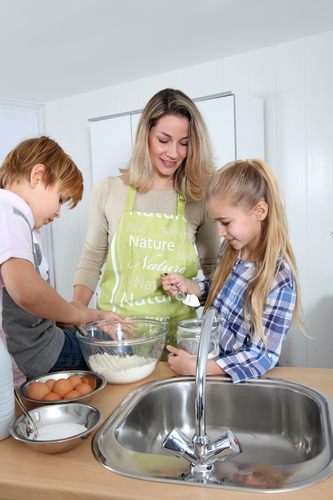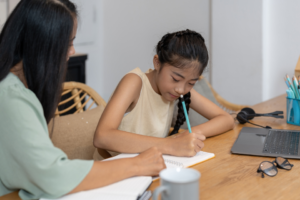
4 Ways to Keep Your Kids Engaged in Math Over the Summer
 Math is used in almost everything you do on a daily basis. Driving, shooting a basketball, cooking, exercising, gardening, and the list goes on. Why not take these opportunities to teach your kids or students how they are using math in these everyday activities. All of these activities involve basic math skills that are super important for kids to learn and will lay a solid foundation for their math learning when they go to school.
Math is used in almost everything you do on a daily basis. Driving, shooting a basketball, cooking, exercising, gardening, and the list goes on. Why not take these opportunities to teach your kids or students how they are using math in these everyday activities. All of these activities involve basic math skills that are super important for kids to learn and will lay a solid foundation for their math learning when they go to school.
1. Shopping – Going to the grocery store can actually be fun! Have your kids try to estimate the total cost of the bill and whoever gets the closet, wins some sort of prize. Once they get a little older and better at this then you can have them try to estimate to the total cost plus the tax. Many students really struggle with understanding percentages and how tax is calculated. What a great learning lesson to teach kids at a young age! Another great way to incorporate math fun while shopping is when you’re dining out. Every time the family is eating out at a restaurant, have your kids calculate a 10% tip, 15% tip and 20% tip, without using some sort of calculator. Here’s the easiest way to calculate a 20% tip: Let’s say for example, that the total bill is $64.50. Have them move the decimal place one place to the left to get $6.45. Take that number and then double it to get $12.90 or $13.00. These are important skills that kids really need to learn at a young age.
2. Sports – Many kids are involved in some sort of sports activity during the summer. They can learn so much about math while playing or watching one of their favorite games! Math is used everywhere in sports, especially with statistics in baseball. These statistics are used to determine how well the players perform and what the outcomes will be. Kids can learn the basics of statistics just by analyzing a batter’s hitting percentage or the number of times at bat. You can explain to your kids that a batter’s hitting percentage is the number of hits divided by the number of times at bat and talk about what number represents a good hitting average and why. Have your kids keep track of their own statistics for a sports team that they’re on.
3. Traveling – There are many ways to keep kids entertained while traveling and help them practice their math skills. A fun game to play while traveling in a car is to see who can add up the numbers on a given license plate the quickest. This helps kids practice their mental math skills. Another idea would be to have your kids estimate the total cost of gas that needs to be put in the vehicle. If gas costs $2.39 a gallon, how much would it cost to fill 10 gallons or 12 gallons? Lastly, you can teach them about the relationship between distance, rate and time. Have them figure out how long it would take to travel 50 miles if you’re traveling at a speed of 45 mph.
4. Cooking/Baking – Get creative and messy in the kitchen while learning about math! A lot of kids really enjoy helping their parents cook and bake and this can promote a great learning experience with basic math skills. Students often struggle with understanding how to add and subtract fractions and this can be taught while measuring out ingredients for various recipes. Many times recipes need to be scaled to fit a larger or smaller group of people. This would be a great way to introduce or reinforce the idea of how to count and perform operations with fractions. For example, if a recipe calls for ¾ cup of flour and you need to double the recipe, you can teach your kids that in order to add two fractions, you need a common denominator. Once you have a common denominator, then you can add the numerators together and place that number over the common denominator. The last step would be to reduce the fraction. So, and reduces to or 1.5 cups.
Take the summer to keep your kids up to speed on their math skills!
Written by Sarah Kochan



